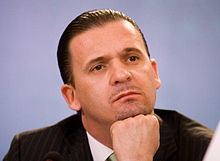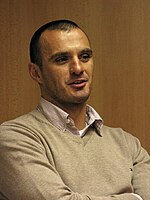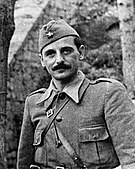History of FK Partizan
The following is a history of Serbian football club Partizan Belgrade.
Club history
Formation (1945)
Partizan was founded on 4 October 1945 in Belgrade, as a football section of the Central House of the Yugoslav Army "Partizan", and was named in honour of the Partisans, the communist military formation who fought against fascism during World War II in Yugoslavia.[1] The club was formed and initially managed by the group of young high officers of the Yugoslav People's Army. Among them were Svetozar Vukmanović, Koča Popović and Ratko Vujović.
In an interview marking the 50th anniversary of the club, Koča Popović stated, "Most of us, young generals who played and loved football, we gathered and agreed to start a football club. We did not argue over what the name would be. We were Partisans, it was most natural to call our club Partizan."[2]
Two days after its establishment, Partizan made its first step on the football scene, with the friendly match against selection of
Early years (1946–1958)

Finally, in late August, 1946, the new
Partizan's babies - the first European final (1958–1966)
1966 European Cup Final starting lineup (coach: Abdulah Gegić )
|
By the mid-1950s, the first big Partizan generation was well over its peak. Only two titles and four cups in first 15 years of existence were not enough for a club of Partizan's stature, ambition and popularity. In 1958, club left way behind 13 years of playing in blue-red kits and adopted the now famous black and white colors. The change in a club's image and appearance was followed by radical changes in the playing squad. The number of young players, offsprings of Partizan's own youth ranks known as Partizanove bebe (The Partizan's babies), soon emerged into one of the best generations Europe's ever seen. The rise of the generation began with Milutin Šoškić, Fahrudin Jusufi, Jovan Miladinović, Velibor Vasović, Milan Galić, Ilija Mitić, Zvezdan Čebinac and Vladica Kovačević. Very soon, they were joined by Lazar Radović, Velimir Sombolac, Ljubomir Mihajlović and Mustafa Hasanagić, and finally Ivan Ćurković, Josip Pirmajer, Branko Rašović and Radoslav Bečejac. Managers Spitz, Matekalo and Bobek monitored and guided their development. The decision to rely mostly on talented youngsters scouted throughout the country quickly gave results – Partizan took three consecutive championship titles, in 1961,[6] 1962[7] and 1963,[8] the first title hat-trick in the Yugoslav First League. Efficient and attractive performances earned the club its popular nickname Parni valjak (The Steamroller). In 1964–65 season, the team added the fourth title in five years[9] (interrupted by city rival Red Star during the 1963–64 season). As early as the 60s, a fierce and intense rivalry grew up between Partizan and Red Star.
The
Crisis (1966–1976)
The sudden increase in the reputation of Partizan team was not followed by increase in the organizational structure. After the defeat in the finals, club administration failed to operate on a higher level, and Partizan entered a long organizational crisis. All main players signed contracts with biggest western clubs, and the promising generation was scattered.
The brief return - the first European trophy (1976–1982)
On 11 July 1976, in
Memorable years (1982–1991)

When
In
Partizan spent the final years in
Dark decade and domestic success (1990s)

After the death of President
During these turbulent 1990s, the club won also several national cups, this in 1992, 1994 and 1998. The key man for these trophies was
Domination in Serbia and reestablishment in Europe (2000–2012)
The new millennium has arrived, but the goals remain the same. In the last 12 years, Partizan has won 8 national championships, 4 cups and qualified two times for the
First time in Champions League (2003–2007)

The club's management took the 2003 season very seriously so, they appointed as the new coach the former
Playing in Europe was reflected in the championship and the Partizan lost the title. New coach
Period under coach Slaviša Jokanović (2007–2009)
Former Partizan player
Recent years (2010–present)
| Partizan's starting XI under coach Aleksandar Stanojević in their UEFA Champions League group stage match with Arsenal on 8 December 2010.[42] |


In the following season, the elimination during the
Partizan is after 1 year pause entered at the
A few days after sixth double in club history, coach Nikolić left the club and signed with Hungarian club
In
Many players contributed to successes of the last twelve years, some of them are
and many more.Further reading
- Radović, Dušan (2010). Parni valjak. MASCOM. ISBN 978-86-7806-176-9.
- Bulić, Vanja (2010). Šole. GRAFOPRINT. ISBN 978-86-7432-047-1.
References
- ^ "Club history". partizan.rs. Retrieved 27 February 2012.
- ^ "Istorija kluba" (PDF) (in Serbian). Partizan.rs. Retrieved 20 September 2012.
- ^ "FK Partizan". UEFA.com. Retrieved 18 September 2012.
- ^ "Sezona 1946/47 i prva titula" (in Serbian). partizan.rs. Archived from the original on 2011-04-18. Retrieved 14 September 2012.
- ^ "Sezona 1948/49 i druga titula" (in Serbian). partizan.rs. Archived from the original on 2011-07-09. Retrieved 14 September 2012.
- ^ "Treca titula" (in Serbian). partizan.rs. Archived from the original on 2011-04-15. Retrieved 14 September 2012.
- ^ "Druga zaredom - cetvrta ukupno" (in Serbian). partizan.rs. Archived from the original on 2011-04-12. Retrieved 14 September 2012.
- ^ "Treca titula u nizu - peta ukupno" (in Serbian). partizan.rs. Archived from the original on 2011-04-12. Retrieved 14 September 2012.
- ^ "Sezona 1964/65 i sesta titula" (in Serbian). partizan.rs. Archived from the original on 2011-04-17. Retrieved 14 September 2012.
- ^ Partizan Belgrade - Sparta Prague 5-0 (1966)
- ^ "13 April 1966 European Cup vs Partizan Belgrade". aboutmanutd.com. Archived from the original on 5 November 2012. Retrieved 14 September 2012.
- ^ Partizan Belgrade - Manchester United 2-0 (1966)
- ^ "1965/66 European Champions Clubs' Cup". uefa.com. Retrieved 14 September 2012.
- ^ "1965/66: Madrid make it six". uefa.com. Retrieved 14 September 2012.
- ^ "Sezona 1975/76 - veliki povratak i 7 titula" (in Serbian). partizan.rs. Archived from the original on 2011-04-23. Retrieved 14 September 2012.
- ^ "Sezona 1977/78 - Osma titula" (in Serbian). partizan.rs. Archived from the original on 2011-04-17. Retrieved 14 September 2012.
- ^ "Dragan Mance" (in Serbian). sport.blic.rs. Archived from the original on 7 September 2012. Retrieved 14 September 2012.
- ^ Gravediggers Canada 1987 (13 October 2008). "Partizan – QPR (4–0) Remix on YouTube". YouTube. Retrieved 10 June 2011.
{{cite web}}: CS1 maint: numeric names: authors list (link) - ^ "Top 100: Greatest matches 70–61". uk.eurosport.yahoo.com. Retrieved 26 September 2009.
- ^ "3. septembra 1985. poginuo Dragan Mance" (in Serbian). telegraf.rs. Retrieved 16 September 2012.[permanent dead link]
- ^ "Dragan Mance dobio ulicu" (in Serbian). b92.net. Retrieved 14 June 2011.
- ^ "Sezona 1985/86" (in Serbian). partizan.rs. Archived from the original on 2011-04-13. Retrieved 14 September 2012.
- ^ Saga over As Dong Joins Man Utd at china.org.cn, 18-1-2007, Retrieved 5-4-2012
- ^ wordpress.com - Kosovo: Europa’s Mafia Staat
- ^ Steven Erlanger, ‘Human-rights Group Assails Nato For Yugoslavia Bombing Campaign’, Chicago Tribune, Chicago, June 8, 2000, [1]
- ^ "Sezona 2001/02" (in Serbian). partizan.rs. Archived from the original on 2011-06-05. Retrieved 14 September 2012.
- ^ "Sezona 2002/03" (in Serbian). partizan.rs. Archived from the original on 2011-04-12. Retrieved 14 September 2012.
- ^ "Njukasl snažno pogođen pobedom Partizana 0:1" (in Serbian). bbc.co.uk/sr. Retrieved 14 September 2012.
- ^ "Partizan sa Realom, Portom i Marsejom! (raspored)" (in Serbian). b92.net. Retrieved 14 September 2012.
- ^ "Od Livorna do Glazgova" (in Serbian). novosti.rs. Retrieved 14 September 2012.
- ^ "Slaviša Jokanović trener Partizana" (in Serbian). politika.rs. Retrieved 14 September 2012.
- ^ "Brazilac Žuka u Partizanu" (in Serbian). b92.net. Retrieved 14 September 2012.
- ^ "Sezona 2007/08" (in Serbian). partizan.rs. Archived from the original on 2011-06-05. Retrieved 14 September 2012.
- ^ "Sezona 2008/09" (in Serbian). partizan.rs. Archived from the original on 2011-04-15. Retrieved 14 September 2012.
- ^ ""Grobari" sahranili Partizan u Evropi" (in Serbian). sport.blic.rs. Retrieved 14 September 2012.
- ^ "Partizan disqualified from UEFA Cup". uefa.com. Union of European Football Associations. 26 July 2007. Archived from the original on 26 May 2008. Retrieved 14 May 2008.
- ^ "Partizan decision deferred". uefa.com. Union of European Football Associations. 31 July 2007. Archived from the original on 19 May 2008. Retrieved 14 May 2008.
- ^ "MONDO: Zvezdin Kleo je igrač Partizana!" (in Serbian). mondo.rs. Archived from the original on 16 April 2013. Retrieved 14 September 2012.
- ^ "Partizan power to record victory". uefa.com. Retrieved 14 September 2012.
- ^ "Partizan sa Seviljom, Štutgartom, Sampdorijom i Standardom" (in Serbian). politika.rs. Retrieved 14 September 2012.
- ^ "Partizan u grupi sa Šahtjorom, Brižom i Tuluzom" (in Serbian). rts.rs. Retrieved 14 September 2012.
- ^ [2] Football-lineups.com: Arsenal - Partizan Belgrade Champions League 2010/11. 8 December 2010. Retrieved 14 December 2019.
- ^ "Stanojević umesto Stevanovića" (in Serbian). b92.net. Retrieved 14 September 2012.
- ^ "Sezona 2009/10" (in Serbian). partizan.rs. Archived from the original on 2011-04-09. Retrieved 14 September 2012.
- ^ "Sezona 2010/11 i dupla kruna" (in Serbian). partizan.rs. Archived from the original on 2011-06-05. Retrieved 14 September 2012.
- ^ "Partizan u Ligi šampiona!" (in Serbian). novosti.rs. Retrieved 14 September 2012.
- ^ "Liga šampiona: Partizan u grupi sa Arsenalom, Šahtjorom i Bragom!" (in Serbian). sport.blic.rs. Retrieved 14 September 2012.
- ^ Milosavljevic, Zoran (13 January 2012). "Grant takes over at Partizan Belgrade - club". Reuters. Retrieved 20 October 2020.
- ^ a b [Chelsea wins European soccer’s Champions League, four years after failing under Israel’s Grant "Chelsea wins European soccer's Champions League, four years after failing under Israel's Grant"]. The Times of Israel. 20 May 2012. Retrieved 20 October 2020.
{{cite news}}: Check|url=value (help) - ^ "Partizan smenio Vermezovića, Rašović novi trener!" (in Serbian). sportal.rs. 7 June 2013. Archived from the original on 18 May 2015.
- ^ a b "Partizan šampion! Crno-beli se izjednačili sa Zvezdom po broju titula!" (in Serbian). The Blic. 22 May 2013. Archived from the original on 18 May 2015.
- ^ "Partizan opet u Ligi Evrope!" (in Serbian). b92.net. Retrieved 28 August 2014.
- ^ "Partizan u grupi sa Totenhemom, Bešiktašem i Asterasom" (in Serbian). mozzartsport.com. Retrieved 29 August 2014.
- ^ "KRAJ: Partizan - Dila Gori 1:0!" (in Serbian). mozzartsport.com. Retrieved 14 July 2015.
- ^ "KRAJ: Partizan - Steaua 4:2, Liga šampiona na dohvat ruke! (VIDEO)" (in Serbian). mozzartsport.com. Retrieved 29 July 2015.
- ^ Црно-бели миљеници среће: Партизан на БАТЕ Борисов за Лигу шампиона (in Serbian). zurnal.rs. Retrieved 24 January 2015.
- ^ "KRAJ: BATE Borisov - Partizan 1:0! (VIDEO)" (in Serbian). mozzartsport.com. Retrieved 24 January 2015.
- ^ "KRAJ: Partizan – BATE Borisov 2:1" (in Serbian). mozzartsport.com. Retrieved 24 January 2015.
- ^ "Liga Evrope: Partizan sa Bilbaom, AZ Alkmarom i Augzburgom" (in Serbian). novosti.rs. Retrieved 28 January 2016.
- ^ "Partizan too strong for ten-man AZ". uefa.com. Retrieved 28 January 2016.
- ^ "FC Augsburg Partizan 1–3". worldfootball.net. Retrieved 28 January 2016.
- ^ "Marko Nikolic is the new manager of Videoton FC". vidi.hu. 6 June 2017. Retrieved 6 June 2017.
- ^ "Djukic regresa para meter al Partizan en la Champions" [Djukic returns to put Partizan in Champions] (in Spanish). Super Deporte. 7 June 2017. Retrieved 12 July 2017.
- Sportski Žurnal. 24 August 2017. Retrieved 25 August 2017.
- ^ "PARTIZAN DOBIO GRUPU: Spektakl u Humskoj, ali crno-beli dobro prošli" (in Serbian). HotSport. 25 August 2017. Retrieved 25 August 2017.
- ^ "Liga Evrope: Zvezda protiv CSKA Moskve, Partizan ide na Viktoriju" (in Serbian). Noizz. 11 December 2017. Retrieved 11 December 2017.
- ^ UEFA.com. "UEFA Europa League - Beşiktaş-Partizan". UEFA.com. Retrieved 2019-06-30.
- ^ N1, Piše (2019-03-27). "Savo Milošević novi trener Partizana". Dnevni list Danas (in Serbian). Retrieved 2019-06-30.
{{cite web}}: CS1 maint: numeric names: authors list (link) - ^ "Crvena Zvezda vs. Partizan - 23 May 2019 - Soccerway". int.soccerway.com. Retrieved 2019-06-30.
- ^ "Rikardo Gomeš ili Leonardo? Napadač Partizana će imati ekstra motiv da postigne gol na Marakani!". Sportske.net. Retrieved 2019-06-30.
External links
- Official website (in Serbian and English)




